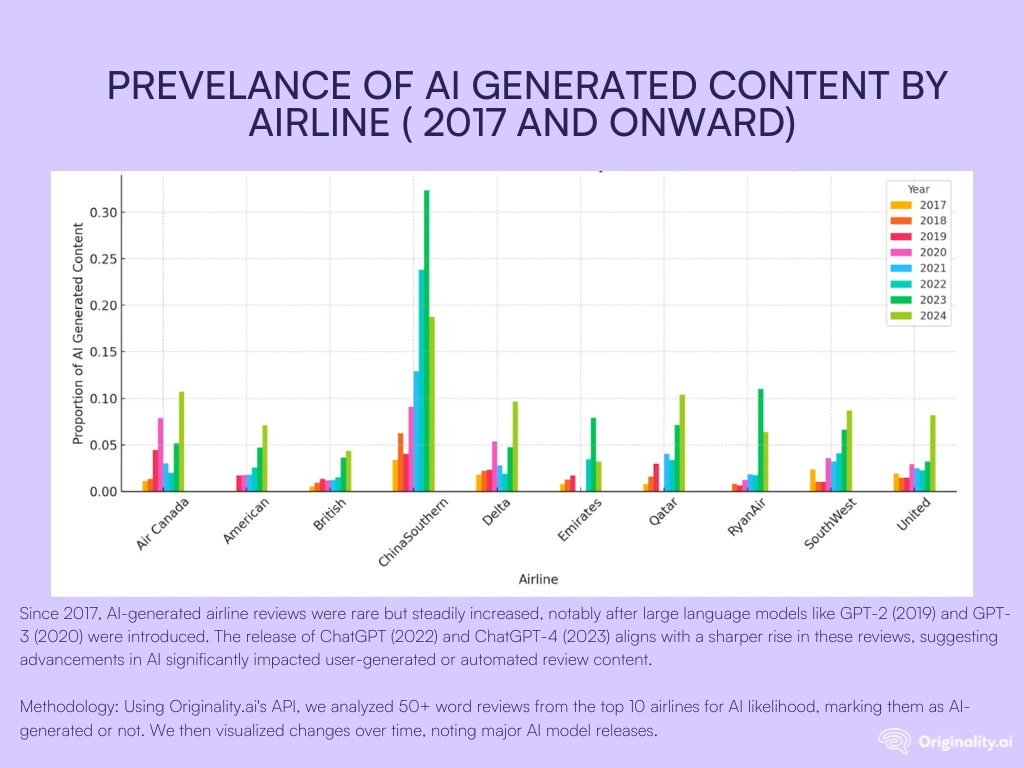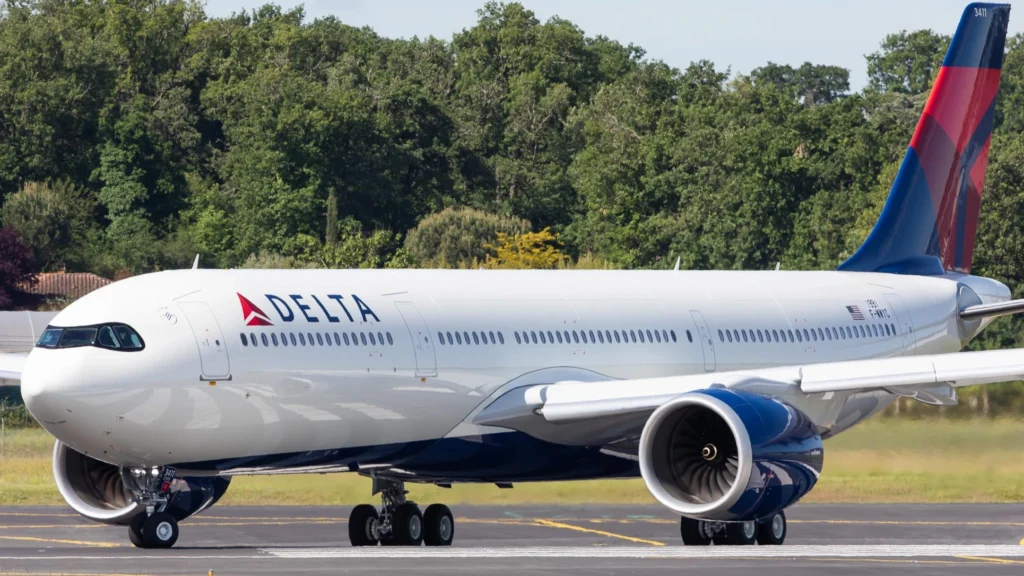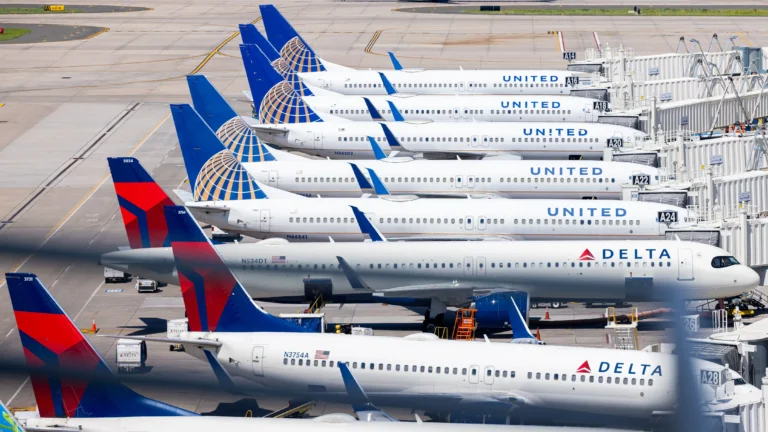A surge in fake AI-generated content threatens consumer trust in online reviews. Shoppers face growing difficulties in identifying authentic feedback.
Research by Originality.ai shows a 400% increase in AI-written Amazon reviews following Chat-GPT’s release. AI algorithms now create the most extreme ratings, particularly one-star and five-star reviews.
The travel sector remains vulnerable to this trend. Travelers need reliable reviews when selecting airlines due to high costs and specific service requirements. Accurate passenger experiences help customers make informed choices about flight bookings.

Increase in Fake AI-Generated Airline Reviews
A recent study found experienced teachers could only accurately identify 37.8% of AI-generated texts. This highlights the need for robust AI content detectors, which significantly outperform humans in identifying artificial content.
This raises pressing concerns about the reliability of reviews across platforms like AirlineQuality, TripAdvisor, Google Reviews, and airline-specific portals.
Both airlines and consumers must now grapple with the possibility that AI-written content is skewing perceptions of service quality and trustworthiness.
A study analyzed reviews from the travel platform Skytrax to detect AI-generated content across 10 global airlines. The analysis revealed a significant rise in fake AI-generated airline reviews in recent years.
Over the last 3 years, following the release of ChatGPT, fake AI-generated airline reviews increased by 189%. The dataset shows fake AI-generated content was relatively rare before 2017 but steadily grew across multiple airlines.
The introduction of advanced language models like GPT-2 in 2019 and GPT-3 in 2020 likely contributed to this trend, as more sophisticated text generation tools became widely available. This is reflected in the noticeable uptick in fake AI-generated reviews starting around 2020.
The release of ChatGPT in late 2022 and ChatGPT-4 in 2023 coincides with even steeper growth in AI-generated airline review rates. This suggests that advancements in AI capabilities directly impacted user-generated content or automated systems creating airline reviews.
The visualized data provides several insights into the evolution of AI-generated content in airline reviews across different carriers over the years.

Southwest, United Lead in Fake Reviews
In 2024, Southwest Airlines (WN) had the highest percentage of AI-generated reviews among U.S. airlines at 8.7%.
Meanwhile, United Airlines (UA) experienced the most dramatic surge in fake reviews over the past year, with a 157% increase.
This sharp uptick highlights potential challenges for United in managing its online reputation and ensuring reviews reflect genuine customer experiences.
The substantial presence of AI-generated reviews across the airline industry may prompt carriers to adopt more rigorous verification measures. Travelers increasingly rely on online feedback when making booking decisions, underscoring the need for authentic reviews.
Other US Airlines see a surge in their fake AI-generated reviews. From 2021 onward, several airlines experienced notable increases in fake AI-generated review rates.
- American Airlines (AA) experienced a 296% increase, rising from 1.8% in 2021 to 7.1% in 2024.
- Delta’s AI-generated reviews rose more modestly, from 2.8% in 2021 to 9.7% in 2024 – a 244% growth.
- SouthWest Airlines saw consistent growth, with AI-generated content rising from 3.2% in 2021 to 8.7% in 2024 – a 172% increase.
- United Airlines similarly exhibited a significant 230% rise, from 2.5% in 2021 to 8.2% in 2024.
These trends across major airlines raise concerns about the integrity of online reviews and their influence on travelers’ booking decisions.

Impact of AI-Generated Reviews on Airline Customer Sentiment
The blue data points represent individual days’ median sentiment scores, each indicating the collective feedback of reviews made on that day.
The green dashed line is a Lowess smoothed line, which highlights longer-term trends by smoothing out short-term variations.
Positive sentiment scores (above zero) suggest generally favorable reviews, while negative scores (below zero) indicate dissatisfaction or negative feedback.
Sharp drops in sentiment may correspond to specific events, such as poor service incidents or flight cancellations. Gradual changes could reflect broader shifts in customer perceptions over time.
If the green smoothed line shows a steady upward or downward trend, this indicates a sustained improvement or decline in customer satisfaction.
By comparing the individual data points with the smoothed line, one can identify immediate shifts in sentiment as well as general patterns emerging over time.
This analysis aims to understand how the rise of AI-generated reviews may have impacted customer sentiment in the airline industry.

Customer Sentiment on US Airlines
The correlation between increased AI-generated reviews and declining customer sentiment is particularly clear for Delta.
Delta Air Lines’ (DL) AI-generated reviews rose 244%, from 2.8% in 2021 to 9.7% in 2024. During this time, customer sentiment continued dropping from the highs of 2015 to current lows in 2024.
A similar trend emerged for Southwest Airlines, which saw a 172% increase in AI-generated content, rising from 3.2% in 2021 to 8.7% in 2024.
United Airlines, the airline with the overall lowest customer sentiment from this study, also showed a significant 230% rise in AI-generated content, increasing from 2.5% in 2021 to 8.2% in 2024. However, this did not have a major impact on United’s customer sentiment scores.
As AI-written content becomes more prevalent, airlines may face challenges in maintaining authentic, positive feedback from travelers.

Bottom Line
The data shows that each airline experiencing an increase in AI-generated reviews also exhibits a downward trend in customer sentiment.
This suggests the quality of service customers receive is declining year-over-year.
While AI may not be the sole reason, other factors like increased customer expectations, budget cuts, and operational challenges also likely contribute to this negative sentiment.
However, the lack of authenticity and transparency in customer reviews is also a significant factor. As consumers become less trusting of airline reviews, it could lead to major brands losing market share.
Stay tuned with us. Further, follow us on social media for the latest updates.
Join us on Telegram Group for the Latest Aviation Updates. Subsequently, follow us on Google News

